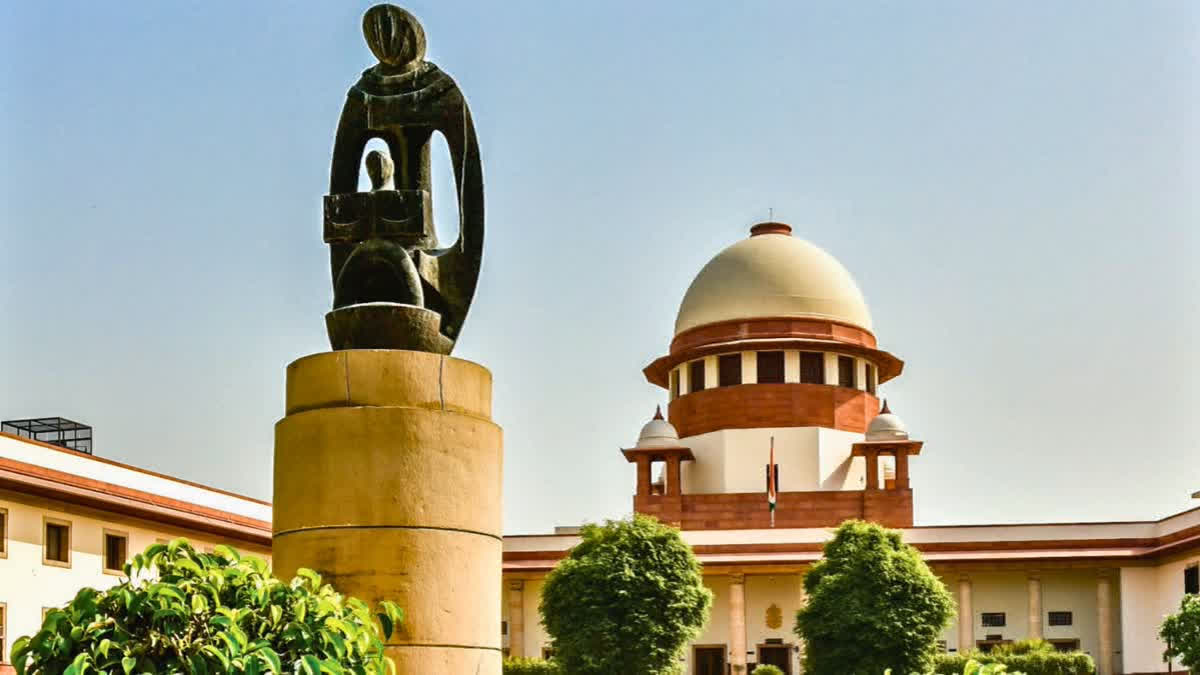New Delhi: The Supreme Court Thursday outlined the consideration which must be borne in mind while implementing the electoral bonds scheme: reducing cash in the electoral process, encouraging authorized banking channels, need for transparency, and also the scheme should not legitimise kickbacks and quid pro quo between the power centres and benefactors.
The apex court stressed that the Centre could design another system which doesn't have the flaws of this system -- they put a premium on opacity. A bench led by Chief Justice of India D Y Chandrachud and comprising justices Sanjiv Khanna, B R Gavai, J B Pardiwala, and Manoj Misra, is hearing a clutch of petitions challenging the validity of the Centre's electoral bonds scheme as a source of political funding.
Solicitor General Tushar Mehta, representing the Centre, submitted that there cannot be a system where a donor and donee, each other would not know. Justice Khanna asked Solicitor General Tushar Mehta, representing the Centre, why not also allow the voter to know about the identity of the donors? Justice Khanna suggested, why not make it open? As it is, everyone knows and the only person who is deprived is the voter, and Mehta’s contention that the voter would not know is slightly difficult to accept. Mehta said then we go back to the earlier policy.
At this juncture, the Chief Justice outlined the considerations, which must be borne in mind while implementing an electoral bonds scheme: 1. the need to reduce the cash element in the electoral process; 2. The need to encourage the use of authorised banking channels; 3. Incentivising the use of banking channels; 4. The need for transparency; and, 5. The scheme should not legitimise kickbacks and quid pro quo between the power centres, whether in Centre or states, and the people who are benefactors of that power.
The Chief Justice said, “the balance (regarding considerations suggested) has to be drawn by the legislature and the executive, and not by us….but it is not that either you have this or you go back to the entire cash system. You can design another system, which does not have flaws of this system, they put a premium on opacity…..devise a system which balances out in a proportional way. How it is to be done (the government has to think), we will not enter that arena….”.
Against the backdrop of five consideration outlined, the Chief Justice said there was a cap that company’s donation would be related to percentage of net profit, it meant that company must be in a position to have net profits and initially it was 5% then it became 7.5% under 2013 Act, and the company may have zero profits, it may have zero turnover but it makes a donation.
Mehta said so far as the condition with regards to profit - a non-profit company cannot donate, because then a shell company can donate, which defeats the objective and the government has removed 2.3 Lakh shell companies from the system. The Chief Justice queried, what will you do? You'll bring an amendment in the Companies Act?
Mehta said amending is a legislative function, which he cannot decide. The Chief Justice queried further, is the government making a statement that we will amend the Companies Act to bring back the position what it was namely that donations will be a percentage of net profit. Mehta said no, I am not saying percentage and I'm only saying that a profit-making company can donate. The Chief Justice cited an example that a company could have Rs 1 profit but it will make a donation of Rs 100 crore, why would a company do that? These caps were introduced for legitimate reasons, namely, the company’s purpose is to carry on business and purpose is not to donate to political parties, “and if your purpose is not to donate to a political party then you donate only a small portion…..”.
On Wednesday, the apex court had observed that the electoral bonds scheme creates an information hole and doesn’t provide for a level-playing field for all political parties. The Centre had contended that the Union Govt doesn't have access to the details of the donors of electoral bonds and the scheme mandates the SBI to keep the information in fiduciary capacity.
Read More
- For level playing field, why not all funds go to ECI for equitable distribution: SC on electoral bonds scheme
- 'Suffers from opacity': SC flags 'selective anonymity' of electoral bonds; scheme doesn't provide level playing field to parties, says CJI
- ‘Electoral bonds scheme limited confidentiality can be lifted by judicial order’, Centre to SC



